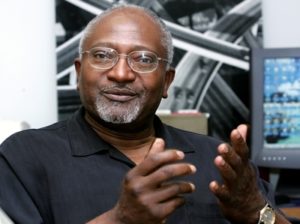
Dr. Robert D. Bullard
Distinguished Professor of Urban Planning and Environmental Policy and Director of the Bullard Center for Environmental and Climate Justice
Often described as the father of environmental justice, Dr. Robert D. Bullard currently serves as distinguished professor of Urban Planning and Environmental Policy and director of the Bullard Center for Environmental and Climate Justice at Texas Southern University. He served as dean of the Barbara Jordan-Mickey Leland School of Public Affairs at Texas Southern University from 2011-2016 and before that was founding director of the Environmental Justice Resource Center at Clark Atlanta University. He publishes widely on sustainable development, environmental racism, urban land use, industrial facility siting, community reinvestment, housing, transportation, climate justice, disasters, emergency response, and community resilience, smart growth, and regional equity.
Dr. Bullard is the author of Dumping in Dixie: Race, Class and Environmental Quality (Westview Press, 2000), a standard text in the environmental justice field. Among the other 17 books authored or edited by Dr. Bullard are: The Wrong Complexion for Protection: How the Government Response to Disaster Endangers African American Communities (with Beverly Wright), Race, Place, and Environmental Justice After Hurricane Katrina: Struggles to Reclaim, Rebuild, and Revitalize New Orleans and the Gulf Coast (with Beverly Wright), Just Sustainabilities: Development in an Unequal World (with Julian Agyeman and Bob Evans), and Confronting Environmental Racism: Voices From the Grassroots.
Complementing his impressive scholarly work, Dr. Bullard is also a long time leader in the environmental justice movement. He helped organize the first National People of Color Environmental Leadership Summit in 1991, which produced the landmark “Principles of Environmental Justice” manifesto, and successfully lobbied for the establishment of the Office of Environmental Justice within the Environmental Protection Agency and the Environmental Justice Executive Order issued by President Bill Clinton in 1994. Dr. Bullard now serves as co-chair of the National Black Environmental Justice Network and, in 2021, President Joe Biden named him to the White House Environmental Justice Advisory Council.
In recognition of the urgent need to diversify leadership in the environmental arena, Dr. Bullard launched the Historically Black College and University Climate Change Consortium with Dr. Beverly Wright, executive director of the Deep South Center for Environmental Justice. In an effort to train the next generation of climate and environmental justice leaders, the consortium has supported hundreds of HBCU faculty, students, and leaders from climate-vulnerable communities to participate in a number of important domestic and international gatherings.
Apolitical named him one of the world’s 100 Most Influential People in Climate Policy; Washington State University honored him with the William Julius Wilson Award for the Advancement of Justice; and Climate One named him the Stephen H. Schneider Award for Outstanding Climate Science Communication. In 2020, WebMD gave him its Health Heroes Trailblazer Award and the United Nations Environment Program (UNEP) honored him with its Champions of the Earth Lifetime Achievement Award, the UN’s highest environmental honor, recognizing outstanding leaders from government, civil society and the private sector whose actions have a transformative impact on the environment. In 2021, President Joe Biden named him to the White House Environmental Justice Advisory Council (WHEJAC). And in 2022, University of California, Berkeley Ecology Law Quarterly gave him its Environmental Leadership Award; Georgetown University awarded him an honorary doctorate; and he was elected to join the American Academy of Arts and Sciences.